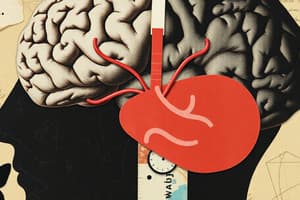Podcast
Questions and Answers
What is the main function of hormones in the body?
What is the main function of hormones in the body?
- Transport oxygen in the bloodstream
- Control and regulate the activity of endocrine glands
- Regulate metabolism, growth, and development (correct)
- Support the immune system
Where is the pituitary gland located?
Where is the pituitary gland located?
- Near the stomach
- In the chest cavity
- At the base of the brain (correct)
- In the neck
Which hormone is NOT produced by the pituitary gland?
Which hormone is NOT produced by the pituitary gland?
- Follicle-stimulating hormone (FSH)
- Prolactin
- Luteinizing hormone (LH)
- Insulin (correct)
What are the three main hormones produced by the thyroid gland?
What are the three main hormones produced by the thyroid gland?
Which endocrine gland is often called the 'master gland'?
Which endocrine gland is often called the 'master gland'?
How do hormones travel through the body to reach their target cells?
How do hormones travel through the body to reach their target cells?
What is the main function of the parathyroid glands?
What is the main function of the parathyroid glands?
Which hormone is responsible for regulating metabolism, immune response, and stress?
Which hormone is responsible for regulating metabolism, immune response, and stress?
What hormone does the pancreas release to lower blood sugar levels?
What hormone does the pancreas release to lower blood sugar levels?
What is the main function of somatostatin produced by the pancreas?
What is the main function of somatostatin produced by the pancreas?
In which condition does hormone resistance occur when cells do not respond efficiently to insulin?
In which condition does hormone resistance occur when cells do not respond efficiently to insulin?
What is the result of hypothyroidism?
What is the result of hypothyroidism?
Flashcards are hidden until you start studying
Study Notes
Endocrine Glands and Their Hormonal Messages
Endocrine glands are specialized organ systems that play a vital role in maintaining the body's homeostasis through the production and secretion of hormones. These chemical messengers regulate various aspects of our lives, from growth and development to metabolism and emotions. To delve into the fascinating world of endocrine glands, let's explore the fundamental aspects of hormones.
What are Hormones?
Hormones are chemical substances produced by endocrine glands that regulate the activity of specific target cells or organs throughout the body. They act as messengers, traveling through the bloodstream to reach their target cells and influence their function, often by binding to specific receptors on the target cell's surface.
The Main Endocrine Glands and Their Hormones
-
Pituitary Gland: This gland, located at the base of the brain, is often referred to as the "master gland" because it controls and regulates the activity of other endocrine glands. Hormones produced by the pituitary gland include thyroid-stimulating hormone (TSH), adrenocorticotropic hormone (ACTH), follicle-stimulating hormone (FSH), luteinizing hormone (LH), prolactin, and growth hormone (GH).
-
Thyroid Gland: Located in the neck, the thyroid gland produces three main hormones: triiodothyronine (T3), thyroxine (T4), and calcitonin. These hormones help regulate metabolism, growth, and development.
-
Parathyroid Glands: These small glands are located on the thyroid gland and are responsible for the production of parathyroid hormone (PTH), which helps regulate calcium levels in the blood.
-
Adrenal Glands: These glands, one located on top of each kidney, produce hormones such as cortisol (which helps regulate metabolism, immune response, and stress), aldosterone (which helps regulate blood pressure and electrolyte balance), and adrenaline (epinephrine) and noradrenaline (norepinephrine), which help regulate the body's response to stress.
-
Gonads: The testes in males and ovaries in females produce sex hormones such as testosterone and estrogen, which regulate sexual development, growth, and reproduction.
-
Pancreas: This gland, which is more widely known for its role in regulating blood sugar levels with insulin and glucagon, also produces the hormone somatostatin, which helps regulate growth hormone production in the pituitary gland.
Feedback Loops and the Endocrine System
The endocrine system operates through a series of feedback loops that maintain the body's homeostasis. For example, when blood sugar levels rise, the pancreas releases insulin, which signals cells to take up glucose and lower blood sugar levels. If blood sugar levels fall too low, the pancreas releases glucagon, signaling the liver to release stored glucose and raise blood sugar levels.
Hormone Resistance and Dysfunction
Hormone resistance occurs when target cells do not respond adequately to hormonal signals, leading to dysfunction in hormonal regulation. For example, in insulin resistance, cells do not respond efficiently to insulin, making it more difficult for the body to maintain appropriate blood sugar levels.
Dysfunction can also arise if endocrine glands do not produce sufficient amounts of hormones (hyposecretion) or produce too much (hypersecretion). For instance, hypothyroidism occurs when the thyroid gland does not produce enough T3 and T4, leading to a slow metabolism, lethargy, and weight gain. In contrast, hyperthyroidism results from excessive production of T3 and T4, causing rapid metabolism, weight loss, and increased heart rate.
Conclusion
Endocrine glands and hormones work together in a complex network to regulate and maintain the body's homeostasis. Understanding the roles of these glands and their hormones is essential to appreciating the intricacies of human physiology and the importance of maintaining a well-balanced endocrine system. In the next section, we will explore the effects of hormones on growth and development.
Studying That Suits You
Use AI to generate personalized quizzes and flashcards to suit your learning preferences.




